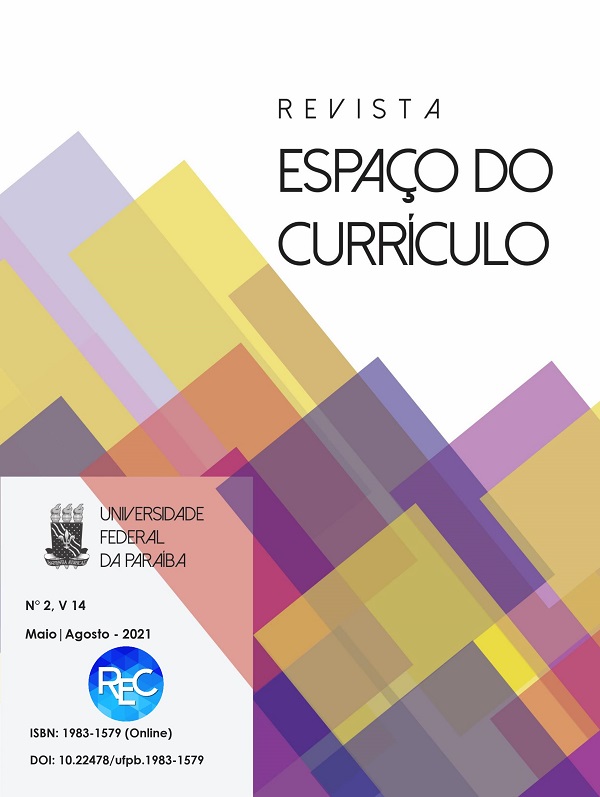RIGHT TO EDUCATION IN PANDEMIC
defending life and not the curriculum requirements of the BNCC
DOI:
https://doi.org/10.22478/ufpb.1983-1579.2021v14n2.58060Keywords:
Pandemic, Curriculum, Right to education, Rural EducationAbstract
The guidelines of the public management and social control bodies of educational policies for the emergency period of the pandemic, have presented bureaucratic and standardized solutions to follow up the school year and the curriculum in education networks and systems. This article presents an analysis of the education scenario based on the reflections of Rural Education collectives, aiming to debate how the Brazilian State has been neglecting the right to education, in view of the centrality given to BNCC and the legitimacy of remote teaching, which weaken the students' integral human formation and collaborate, in an expressive way, for the State's lack of responsibility for the structural policies that make possible the offer of quality education, during and after the pandemic. It is concluded that in order to overcome such contradictions, it is essential that the Brazilian State and social control bodies, deepen the analysis on the effective conditions of the education offer in the pandemic and broaden the dialogue channels with the communities and schools, aiming to know the different realities and, thus, build concrete solutions that ensure the right to education for all.
Downloads
Metrics
References
AGÊNCIA BRASIL. Pesquisa Tic Kids online 2019. Disponível em: https://agenciabrasil.ebc.com.br/tags/tic-kids-online. Acesso em: 10 nov. 2020.
BRASIL. Constituição (1988). Constituição da República Federativa do Brasil: promulgada em 05 de outubro de 1988. Brasília: Imprensa Oficial, 1988.
BRASIL. Lei nº 9.394, de 20 de dezembro de 1996. Estabelece as Diretrizes e Bases da Educação Nacional. Brasília: Câmara Federal, 1996.
BRASIL. Base Nacional Comum Curricular. Educação é a Base. Brasília, DF: Ministério da Educação, 2017.
CARTA ABERTA EM DEFESA DA EDUCAÇÃO DEMOCRÁTICA (CONTRA PROJETOS DE CENSURA À EDUCAÇÃO NACIONAL), Disponível em: http://www.anfope.org.br/wp-content/uploads/2018/07/CARTA-Aberta-em-defesa-da-EDUCA%C3%87%C3%83O-DEMOCR%C3%81TICA-.pdf. Acesso em: 13 fev. 2021.
CETIC.BR - CENTRO REGIONAL DE ESTUDOS PARA O DESENVOLVIMENTO DA SOCIEDADE DA INFORMAÇÃO (CETIC.BR). Disponível em: https://www.cetic.br/pesquisa/domicilios/. Acesso em 09 abr. 2020.
CRISPIN, Crisleine da Silva. FACCI, Marilda Gonçalves Dias. Significado Social, sentido pessoal e readaptação docente: reflexões à luz da psicologia histórico – cultural. In: FACCI, Marilda Gonçalves Dias; URT, Sônia da Cunha. (Orgs.) Quando os professores adoecem: demandas para a psicologia da educação. Campo Grande, MS: Ed. UFMS, 2020.
FELIPE, Eliana da Silva. Do SAEB à BNCC: padronizar para avaliar. In: UCHÔA, Antônio Marcos da Conceição. LIMA, Átila de Menezes; SENA, Ivânia Paula Freitas de Souza. (Orgs.). Reformas educacionais: avanço ou precarização da educação pública? Diálogos Críticos. Volume 2. Porto Alegre, RS: Editora Fi, 2020. Disponível em: https://www.editorafi.org/793dialogos. Acesso em: 03 mar. 2021.
FONEC – FÓRUM NACIONAL DE EDUCAÇÃO DO CAMPO. Carta do Fórum Nacional de Educação do Campo - FONEC, Articulações, Comitês e Fóruns Estaduais de Educação do Campo e Apoiadores/as. Brasília. 2020. (digitalizado).
FREIRE, Paulo. Pedagogia do Oprimido. Brasília. 42 Edição. Paz e Terra. 2005.
MINISTÉRIO DA EDUCAÇÃO. Diretrizes Curriculares Nacionais para a Educação Básica. Disponível em: http://portal.mec.gov.br/docman/julho-2013-pdf/13677-diretrizes-educacao-basica-2013-pdf/file. Acesso em: 11 fev. 2021.
SANTOS, Clarice Aparecida dos, MOLINA, Mônica Castagna; HAGE, Salomão Antônio Mufarrej. Ensino Remoto e à Distância aprofunda as Desigualdades e não garante o Direito à Educação dos Povos Tradicionais e Camponeses em Tempos de Pandemia, Dez. 2020. Disponível em: https://anped.org.br/news/ensino-remoto-e-distancia-aprofunda-desigualdades-e-nao-garante-o-direito-educacao-dos-povos. Acesso em: 20 de fev. 2021.
SAVIANI, Demerval. MARSÍGLIA, Ana Carolina Galvão. Educação na Pandemia: a “falácia” do ensino remoto. COVID-19. Trabalho e saúde docente. In: ANDES-SN. Universidade e Sociedade 67. Pandemia da Covid-19 - Trabalho e saúde docente, Jan.2021. Disponível em: https://issuu.com/andessn/docs/revista_us_67_web. Acesso em: 05 mar. 2021.
TAFFAREL, Celi Nelza Zulke. SOUSA, Érica Cordeiro Cruz (orgs). Dossiê: contribuição ao debate sobre o que fazer em educação em meio à pandemia do coronavirus. (COVID-19). LEPEL, GEPEC, UFBA – FACED, ANFOPE. Salvador. Julho de 2020. Disponível em: http://www.anfope.org.br/wp-content/uploads/2020/07/DOSSI%C3%8A-CONTRIBUI%C3%87%C3%83O-AO-DEBATE-SOBRE-O-QUE-FAZER-EM-EDUCA%C3%87%C3%83O-vs-11-07-20-compactado.pdf. Acesso em: 05 mar.2021.
Downloads
Published
How to Cite
Issue
Section
License
Copyright (c) 2021 Curriculum Space Journal

This work is licensed under a Creative Commons Attribution 4.0 International License.
By submitting an article to Curriculum Space Journal (CSJ) and having it approved, the authors agree to assign, without remuneration, the following rights to Curriculum Space Journal: first publication rights and permission for CSJ to redistribute this article. article and its metadata to the indexing and reference services that its editors deem appropriate.
















